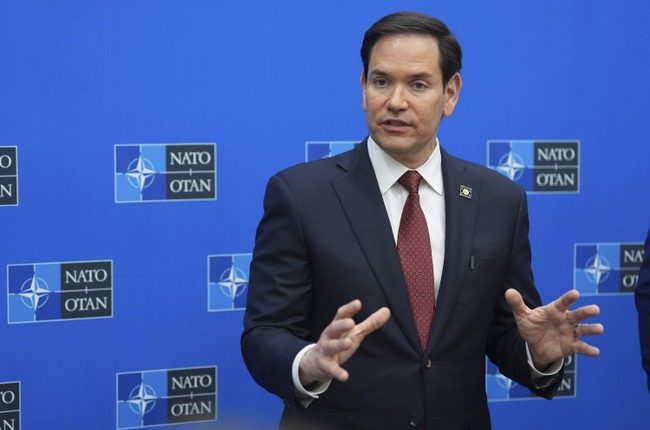
When he’s not assisting with taking out Iran’s nuclear capabilities, revoking visas from those who support terrorism, or helping the president broker peace in Africa, he’s looking after your tax dollars.
“The era of government-sanctioned inefficiency is OVER. From now on, our foreign assistance programs will be accountable to the American taxpayer,” Secretary of State Marco Rubio announced on X today. The post was accompanied by a lengthy Substack essay called “Make Foreign Aid Great Again.
It appears that USAID is officially dead.
For some time, Rubio has maintained that USAID is nothing more than a foreign aid or NGO industrial complex that spans the globe, spreading certain agendas that have little to nothing to do with the United States’ interests and filling the pockets of corrupt leaders. Today, he wrote that since the Cold War:
Development objectives have rarely been met, instability has often worsened, and anti-American sentiment has only grown. On the global stage, the countries that benefit the most from our generosity usually fail to reciprocate. For example, in 2023, sub-Saharan African nations voted with the United States only 29 percent of the time on essential resolutions at the UN despite receiving $165 billion in outlays since 1991. That’s the lowest rate in the world. Over the same period, more than $89 billion invested in the Middle East and North Africa left the U.S. with lower favorability ratings than China in every nation but Morocco. The agency’s expenditure of $9.3 billion in Gaza and the West Bank since 1991, whose beneficiaries included allies of Hamas, has produced grievances rather than gratitude towards the United States. The only ones living well were the executives of the countless NGOs, who often enjoyed five-star lifestyles funded by American taxpayers, while those they purported to help fell further behind.
Rubio continued that as of July 1, 2025, foreign assistance programs under the Donald Trump Administration will prioritize the national interests of our country and will only be administered by the State Department, which will allow for more “with more accountability, strategy, and efficiency.”
“We will not apologize for recognizing America’s longstanding commitment to life-saving humanitarian aid and promotion of economic development abroad must be in furtherance of an America First foreign policy,” he added.
Most importantly, going forward, taxpayers in the United States will be the priority. Not the United Nations. Not multinational NGOs. And not the “broader global community.” The Secretary points out that USAID considered these groups its constituency, not the people who were funding the budget — to the tune of “over $715 billion in inflation-adjusted spending over the decades.”
He continued (emphasis mine):
USAID marketed its programs as a charity, rather than instruments of American foreign policy intended to advance our national interests. Too often, these programs promoted anti-American ideals and groups, from global ‘DEI,’ censorship and regime change operations, to NGOs and international organizations in league with Communist China and other geopolitical adversaries.
That ends today, and where there was once a rainbow of unidentifiable logos on life-saving aid, there will now be one recognizable symbol: the American flag. Recipients deserve to know the assistance provided to them is not a handout from an unknown NGO, but an investment from the American people.
I know the left is already whining about the millions who will supposedly die because of this, but the fact is that cutting USAID is not the problem. The way NGO executives and foreign leaders were handling our taxpayers’ funds is the real issue. The “charity-based model” as Rubio put it was not doing a damn thing for anyone but those who were lining their pockets or misusing the funds and oppressing the people they claimed to help and stifling their potential. People need empowerment, not hand-outs, and that’s a message I’ve heard Rubio echo throughout his travels to underdeveloped nations and meetings with various foreign ministers over the last six months.
After engaging with nations across Latin America and Africa, we have consistently heard that developing countries want investment that empowers them to sustainably grow—not decades of patronizing UN or USAID managed support. The Department has consistently heard the same from people in these nations: a Zambian man told American diplomats it would be more helpful for his countrymen to learn how to fish than to be supplied with fish by the U.S. Government, an Ethiopian woman said she viewed the mutual benefits of investment as superior to the one-sided nature of aid, and too many other examples to recount.
Americans should not pay taxes to fund failed governments in faraway lands. Moving forward, our assistance will be targeted and time limited. We will favor those nations that have demonstrated both the ability and willingness to help themselves and will target our resources to areas where they can have a multiplier effect and catalyze durable private sector, including American companies, and global investment.
He gets into the nuts and bolts of how this will work a little bit (you can read the entire essay here), but he concludes with something that I think is one of the most important points of all: It will make us more competitive with China.
This model will also place us in a stronger position to counter China’s exploitative aid model and further our strategic interests in key regions around the world.
We will do so by prioritizing trade over aid, opportunity over dependency, and investment over assistance. For Americans and many around the world, July 1st will mark the beginning of a new era of global partnership, peace, investment, and prosperity.
I love it. This is not the end. It’s a beginning. We’re not abandoning the world. We’re lifting up those who want to be lifted while prioritizing our own needs and national interests at the same time. It’s basically common sense.
Enjoying our coverage? Get exclusive insights, bold analysis, and more perks with a PJ Media VIP membership. Right now, you can save 60% with the code FIGHT. The battle for truth isn’t won by standing on the sidelines. Join us today!






